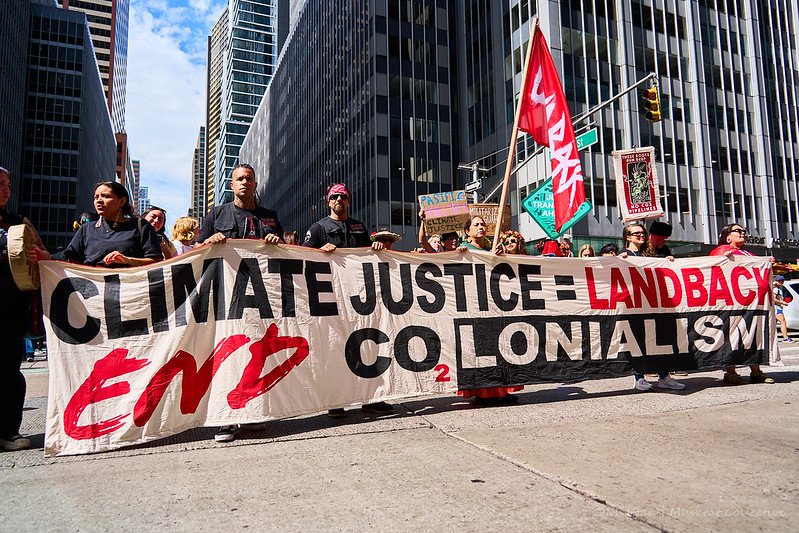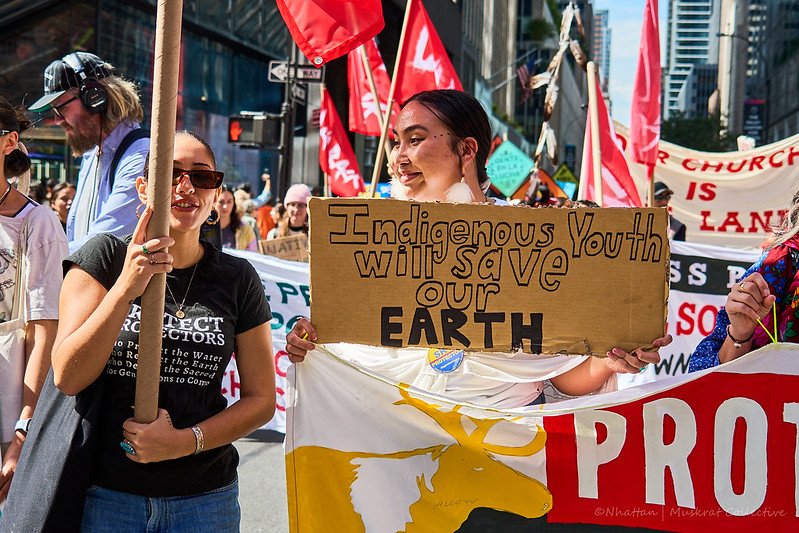We Need More Than Ambitions: Climate Week NYC to COP28 Dubai
From September 17-22, our team attended Climate Week NYC 2023 and the UNSG Climate Ambition Summit. Thousands gathered on the ancestral homeland of the Lenape (Lenapehoking), the Manahatin, the Canarsie, the Shinnecock, the Reckgawanc, Munsee and Haudenosaunee Nation—what we know as the Island of Manhattan (Mannahatta), New York.
75,000 people gathered for the March to End Fossil Fuels in the heart of central New York—what could be considered a major epicenter of the current colonial-capital empire. Two weeks later, the residents of Mannahatta are experiencing first-hand the devastating impacts of the climate crisis through flash flooding, and earlier this summer the air pollution ranked the worst of any city in the world due to wildfire smoke.
We are witnessing right now just how destructive colonization is. The colonial infrastructure of Mannahatta has always posed flooding problems—prior to contact the area was covered in vast wetlands with thousands of river systems—as ecological understandings of this land were never taken into consideration. It is vital to recognize how the foundation of this city is built on the violent displacement of Indigenous stewards of the land, as well as BPOC relatives liberated from slavery to make way for Central Park (a man-made park created to compete with those of Imperial Europe). It’s no coincidence that many of Manhattan’s elite reside in boroughs (like the Upper West Side and Upper East Side) that are notably less prone to flooding than areas inhabited by low-income, unhoused, and BIPOC communities—environmental racism built into the city’s blueprint.
As Indigenous people gathering in global policy and decision-making spaces, fraught with legacies of harm, it is disturbing to see no meaningful recognition of these histories and failure to acknowledge the correlation to the climate chaos we’re seeing across the globe. We cannot reconcile our disconnection to the land when we refuse to acknowledge the impacts of colonialism in these spaces.
What we wanted
Human Rights, Including Indigenous Rights
It is not possible to build just strategies for climate action without centering human rights. As detailed in the Intergovernmental Panel on Climate Change’s (IPCC) synthesis report, released March 20 2023, it is shown that those who have done the least to cause the climate crisis are among the most vulnerable and adversely affected.
Despite the recent 16th anniversary of the United Nations Declaration on the Rights of Indigenous Peoples (UNDRIP), so-called Canada continues to neglect Indigenous peoples as rights holders in this country—though colonization continues allow environmental racism through the use of sacrifice zones—the health and safety of our communities willfully traded for economic gains and industry wealth.
“Now more than ever we need to reconcile with the fact that colonialism—including systems of patriarchy, capitalism, white supremacy, and extractivism—are the cause of climate change. Until we begin to collectively remove these harmful structures we risk replicating and maintaining these systems of harm.” - Eriel Tchekwie Deranger, Executive Director
The End of Fossil Fuels
We must cut greenhouse gas (GHG) emissions urgently, within this decade and no later. To achieve the 1.5°C goal, we need rapid (if not immediate) GHG emissions reductions across all sectors within this decade—and they need to happen at the source—this means an end to the fossil fuel era.
Prioritizing equity and climate justice, including gender justice, is critical for the creation of sustainable, transformative frameworks that are climate resilient. It is clear that without a complete rapid and equitable Just Transition, a strategy for mitigation and adaptation that upholds human rights and the rights of Indigenous peoples with a complete phase-out of fossil fuels—there will be no end to the climate crisis.
What we got
False Claims
Though not formally invited by the UN General Assembly Secretariat, due to so-called Canada’s inability to uphold previous commitments to GHG reductions, Trudeau’s address at the Climate Ambition Summit missed the mark—deceitfully claiming so-called Canada’s GHG emissions have trended down, and completely failed to mention Indigenous rights at all.
Canada is on track to increase emissions over the next ten years, relying on false solutions like carbon market mechanisms (and lack of industry regulation and reporting). Based on a recent Planet Wreckers report by Oil Change International, Canada is one of 20 countries responsible for almost 90% of Carbon Dioxide pollution due to continued funding of new fossil fuel projects between 2023 - 2050.
False Solutions
Trudeau’s environmental platform is built on greenwashing and false solutions that continue to reduce the climate crisis to an economic opportunity. ‘Price on Pollution’ and the ‘Carbon Pricing Challenge’ do nothing to reduce greenhouse gas emissions (GHGs) at source, address the root cause of the climate crisis, or hold the global elite accountable for their role in fuelling climate chaos. These false solutions only further delay effective action and create loopholes that allow fossil fuel companies to continue sacrificing community, lands and waters for business as usual.
Further, Canada’s government lacks the enforcement mechanisms necessary to actually reduce emissions, protect land and people, and uphold Indigenous rights and culture. This lack of strong climate policy will continue to fuel temperature rise, increase impacts on our human and non-human kin, and climatic extremes will become more widespread and pronounced.
Looking to COP28
While colonial leaders talked up so-called ambitious targets and distorted statistics, grassroots organizers were on the ground in NYC naming the root causes of the climate crisis, calling for an end to fossil fuel extraction and uplifting real climate solutions.
“Indigenous communities have been calling attention to solutions driven by our ancestral wisdom and relationships with our traditional lands and waterways. Our solutions expose the fallacy of colonial logic that consistently seeks to reduce the climate crisis to an economic crisis that corporations and colonial governments benefit from.” - Eriel Tchekwie Deranger, Executive Director
As we plan for the UNFCCC COP28 this fall, our work in these international spaces will continue to focus on the work of our communities back home. Climate solutions will not be found at the UNFCCC without us and they will not be found without looking to frontline communities at home. Real solutions are place-based, empower localized decision-making, and react to the needs and experiences of local community members.
“Indigenous peoples know that true climate solutions are found in our communities and with the relationships we steward with the land. It is long overdue for our people to be making the decisions about the solutions we need to mitigate, transition, and survive extreme climate events.” - Jamie Bourque-Blyan, Engagement Manager
The UNFCCC COPs rarely result in real climate solutions, but the decisions made in these spaces can impact our ability to enact real solutions within our territories because of the policies and plans that affect our rights to resourcing and decision-making. ICA has chosen to intervene in these spaces to confront false solutions that promote further destruction of communities, lands, and waters and advocate for Indigenous-led solutions that ensure our kin can continue to exercise our rights and sovereignty back home while protecting the planet for everyone.
We will be sharing more about our plans for COP28 in the coming weeks. Follow along on our social media and website to stay in the know and if you have the capacity, support us on our journey by donating or becoming a sustainer.




